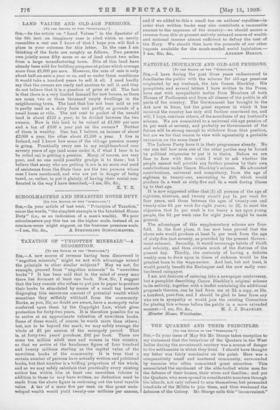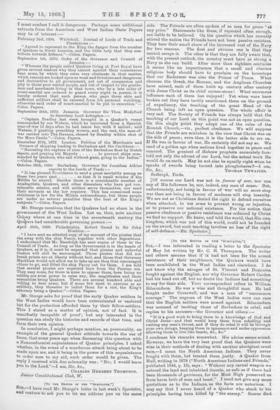THE QUAKERS AND THEIR PRINCIPLES.
[To Tun EDITOR Or run " SPECITATOz."] Stn,—In your issue of May 8th Mr. Sturge takes exception to my statement that the behaviour of the Quakers in the West Indies during the seventeenth century was a source of danger to the settlements in which they lived. I should have thought my letter was fairly conclusive on the point. Here was a comparatively small and scattered community, surrounded by enemies who often committed great atrocities. This necessitated the enrolment of the able-bodied white men for the defence of their homes, their wives and families; and yet the Quakers, who soon spread in considerable numbers through the islands, not only refused to arm themselves, but persuaded hundreds of the Militia to join them, and thus weakened the defences of the Colony. Mr. Sturge calls this " inconvenient" I most confess I call it dangerous. Perhaps some additional extracts from the American and West Indian State Papers may be of interest :-
February 2nd, 1694, Whitehall. Journal of Lords of Trade and Plantations :— " Agreed to represent to the King the danger from the number of Quakers in North America, and the little help that they con- tribute towards defence."—Colon. Papers.
September 1st, 1870. Order of the Governor and Council of Jamaica :—
" Whereas the people called Quakers living at Port Royal have given several reasons why they cannot against their consciences bear arms, by which they seem very obstinate in that matter, which reasons are looked upon as weak and frivolous and dangerous and destructive to all government, yet out of compassion and pity to those poor misled people, and out of respect to the gentle- men and merchants living in that town, who by a late order of court-martial are ordered to guard every night in person, it is hereby ordered that such person who pays three able and sufficient soldiers shall bo excused from his personal watching, otherwise said order of court-martial to be put in execution."— Colon. Papers.
September 20th, 1670. Jamaica. Governor Sir Thos. Modyford to Secretary Lord Arlington :- " Captain Bradley last week brought in a Quaker's vessel commanded by one Watson, which ho recovered from a Spanish man-of-war 13 days after ho had taken her, with 6 sailors ; said Watson, 2 quaking preaching women, and the rest, the man-of- war carried into The Havana, chased by Bradley within shot of the Moro Castle."--Colon. Papers.
December 27th, 1672. London. Petition of the Merchants and Owners of shipping loading to Barbadoes and the Caribbees "Narrating the capture of nine of the Barbadoes fleet by Dutch capers, and praying his Majesty to prevent ships com- manded by Quakers, who sail without guns, going to the Indies." —Colon. Papers.
October 26th, 1680. Barbadoes. Governor Sir Jonathan Atkins reports to the Lords of Trade :— " It has pleased Providence to send a great mortality among us these two years past so that it is small wonder if the Militia be abated. Besides there is a considerable number of Anabaptists, Quakers, and other dissenters who have got con- siderable estates, and will neither serve themselves, nor send their servants as tho law requires. This has occasioned some strictness in law for the Militia extraordinary, but these people are under no severer penalties than the best of the King's subjects."—Colon. Papers.
Mr. Sturge mentions that the Quakers had no share in the government of the West Indies. Let us, then, note another Colony where at one time in the seventeenth century the Qu. (ere bad considerable governing powers :-
April 25th, 1698. Philadelphia. Robert Snead to Sir John Houblon " I have sent an attested copy of my account of the pirates that ran away with the ship Fancy, together with other depositions. I understand that Mr. Randolph has sent copies of them to tho Council of Trade, As long as the Government is in the hands of Quakers, as it is, it must be expected that pirates and unlawful traders will still be encouraged. Those pirates that did not break prison are at liberty without bail, and those that Governor Markham would not allow me to take up are they that encouraged others to go, and fitted the ship Fancy out for them. I am told that several pirates are expected here from the Persian sea. They may come, for there is none to oppose them, here being no militia nor even power to raise any, the magistrates and their assemblies being Quakers. There are several hundred able and willing to bear arms, but if some few meet to exercise as an artillery, they threaten to indict them for a riot, the King's attorney being a Quaker."—Colon. Papers.
Mr. Sturge asks for proof that the early Quaker settlers, in the West Indies would have been exterminated or enslaved but for the protection afforded them by their fellow-settlers. This I stated as a matter of opinion, not of fact. It is manifestly incapable of proof ; but any interested in the question can study the histories and records of that time, and form their own opinion.
In conclusion, I might perhaps mention, as, presumably, an example of the general Quaker attitude towards the use of force, that some years ago when discussing this question with a Nonconformist acquaintance of Quaker principles, I asked whether, in the event of a murderous attack being about to be made upon me, and it being in the power of this acquaintance to order men to my aid, such order would be given. The reply I received with due solemnity was : "No; I would leave you to the Lord."—I am, Sir, &c.,
CHARLES HERBERT THOMPSON. .
Junior Constitutional Club, W.











































 Previous page
Previous page